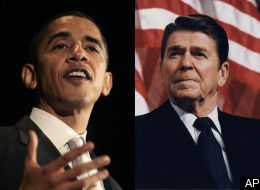
The right has dominated American politics for nearly 30 years. Now we might be facing a definitive moment: The era of Reagan could be replaced by the era of Obama.
God is really a Republican, wrote activist and strategist Paul Weyrich on the homepage of his think-tank Free Congress Foundation after the successful election of 2004. During the last election the conservatives were able to mobilize its foot soldiers in decisive swing states like Ohio, partly because of the proposal to ban gay marriage on the ballot.
Values questions, along with national security, were the important issues in 2004 and it worked to the Republicans’ advantage. The party benefited from the fact that many married white women who had supported Al Gore in 2000, voted Bush four years later because of their fear of terrorism. Bush won 97 of the 100 counties with the fastest growth rate. Many of them were so-called exurbs, country-like suburbs outside large cities.
After the 2004 election, books were published about the Republicans’ organizational abilities. In the book One Party Country: The Republican Plan for Dominance in the 21st Century from 2006, Los Angeles Times journalists Tom Hamburger and Peter Wallsten wrote about the Republicans’ superior campaign machinery which, for example, mobilized orthodox Jews in Ohio for Bush. Strategists Karl Rove and Ed Gillespie were central in this process. Reporter Thomas Edsall reached similar conclusions in the book, Building Red America: The New Conservative Coalition and the Drive for Permanent Power in the same year. He pointed to the Republicans’ successful strategy to polarize electoral groups with cultural questions.
The foundation for the triumph of 2004 was laid in the 1970s when the Christian right was mobilized and the right created a grass roots movement through direct mail for fund-raising. This contributed to the election of Ronald Reagan and a Republican majority in the Senate in 1980. One could say that the Reagan era stretched from 1978 to 2006. When the Republicans took control over both chambers in 1994 for the first time in forty years, the party took political control which forced Bill Clinton to the right. He increasingly accepted the politics for which the Republican congress fought.
Since the success of 2004, the conservative movement has had a hard time. The most conservative Republicans and activists are disappointed by the lack of will President Bush has displayed when it comes to reducing federal spending. Bush has increased spending much more than Bill Clinton did, especially in domestic spending. During their first six years, while the Republicans also controlled Congress, Bush took the party in a direction that broke conservative principles of small government. This was one factor, along with the resistance to the Iraq war, which contributed to the loss of the Republican majority in both chambers of Congress after the mid-term elections in 2006.
Another reason for the decline of the conservative movement is the ongoing struggle between the value conservatives and the free market libertarians. These groups have always had conflicting interests in their view on freedom and order, but the fight against communism held them together during the Cold War, led by anchorman William Buckley, editor of the National Review. The fall of the Soviet empire led to fragmentation and conflict among the conservatives around 1990. The movement came together against Clinton during the 1990s and partly in the war on terror over the last few years, but the conflict has now risen again.
Now the conservative movement is challenged by a revived leftist movement. Democrats have tried to close the gap on the Republicans in fund-raising. Under the leadership of Terry McAuliffe, the Democratic National Committee sent more direct mail during the first four months of 2004 than during in the 1990s. While the Republicans are generally better with using the direct mail strategy, the Democrats are now using the Internet for fund-raising in a much bigger way than the Republicans.
Howard Dean’s successful internet fund-raising strategy made him a favorite before the Democratic primaries during the winter of 2004. Barack Obama has also focused strongly on the support of private individuals on the Internet, something that has enabled him to raise more than three times as much money as John McCain.
The right’s economic ideology is weakened by the serious financial crisis. The economy hasn’t been very important as an issue in an election since 1992, the last time the Democrats took office after Republican rule. The financial crisis has displaced the important Republican issues of national security and moral issues.
If you look at the last 40 years, there can be little doubt that Nixon-advisor Kevin Phillips was right in his prediction of Republican progress in his 1969 book The Emerging Republican Majority: “The party has won seven of the last ten presidential elections, and the so-called Roosevelt coalition is dissolved.” It is too early to tell whether John Judis and Ruy Teixeira is right in their prognosis from 2002, The Emerging Democratic Majority, like Phillips was.
Because of the financial crisis and the need for increased regulation, it seems like we are at a crossroads in economic policy which could favor the Democrats for some time. Historian Arthur Schlesinger, Jr. developed a so-called cycle-thesis which indicates that American politics changes direction roughly every thirty years. After long periods dominated by Franklin Roosevelt and Ronald Reagan we might be facing The Age of Obama.”

Leave a Reply
You must be logged in to post a comment.